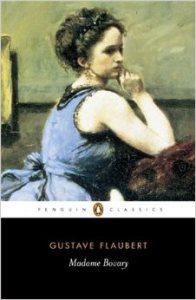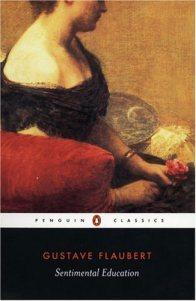

The best thing about Madame Bovary is Emma Bovary. Foolish, deluded Emma, to be sure, but she is someone whose story creates a powerful impact, one that has remained with me since the first time I read it at 17 years of age. I seemed to feel the dreams that Emma carried for her life, and the disappointment she felt in her marriage to bumbling Charles. I understood the intrigue she felt toward the dashing Rodolphe. I was as shocked as Emma herself when she was left by him, deceived that his intentions were for good. Even her death seemed somehow romantic, in a tragic sort of way. Emma's character interested me the whole time I read the novel.
But as for Frédéric Moreau in Sentimental Education, what an indecisive, selfish twerp! He cannot decide what he wants to be: a lawyer, a painter, a landowner. He falls in love with Mme Arnoux, married woman that she is, but then makes promises to Louise Roque, the landowner's daughter, and in fits of uncertainty holds dalliances with courtesan Rosanette. Toward the end of the novel he has even become involved with Mme Dambreuse, a woman he supposes to be wealthier than she is.
The women Flaubert portrays give their hearts away completely, the men not at all. They exist, in these two novels, to satisfy themselves. So how is it that the title I just finished can be Sentimental Education? Perhaps we find the answer in this quote from Oscar Wilde:
A sentimentalist is one who desires to have the luxury of an emotion without paying for it.
In that sense, it fits Frédéric perfectly. He says he loves Mme Arnoux, insists on it despite his actions to the contrary throughout the novel, but is not willing to sacrifice what it would require to make her his own.
A few quotes which struck me as I read through the book this month, not all of them ones I necessarily agree with, but interesting to think about all the same:
For certain men action becomes more difficult as desire becomes stronger. They are embarrassed by self-doubt, and terrified by the fear of being disliked. Besides, deep feelings of affection are like virtuous women: they are afraid of being discovered, and go through life with downcast eyes.
All the evil scattered over the earth he naively attributed to Power; and he hated it with a deep-rooted, undying hatred that took possession of his heart and refined his sensibility.
...let us confess that there is such a thing as poverty! But the remedy depends neither on science nor on power. It is purely an individual question. When the lower classes are willing to get rid of their vices, they will free themselves from their necessities. Let the people be more moral, and they will be less poor!
He imagined that he had offended them, not realising what vast reserves of indifference society possesses.
It was necessary to bring down the wealthy. And he represented them as wallowing in crime under their gilded ceilings; while the poor, writhing in their garrets with famine, cultivated every virtue.
The hearts of women are like little cabinets, full of secret drawers fitted one inside the other; you hurt yourself, break your nails in opening them, and then find within only some dried flowers, a few grains of dust-or, nothing!
They had both failed in their plans-the one who dreamed only of love, and the other of power. What was the reason for this?
"'Tis perhaps from not having kept to a steady course," said Frederic.
"In your case that may be so. I, on the contrary, have sinned through excess rigidity, without taking into account a thousand secondary things more important than any other. I had too much logic, and you too much sentiment."
I read this this book in part for the Back to The Classics Challenge 2016 hosted by Books and Chocolate. I was also interested in picking it up after reading thoughts from Wuthering Expectations.

